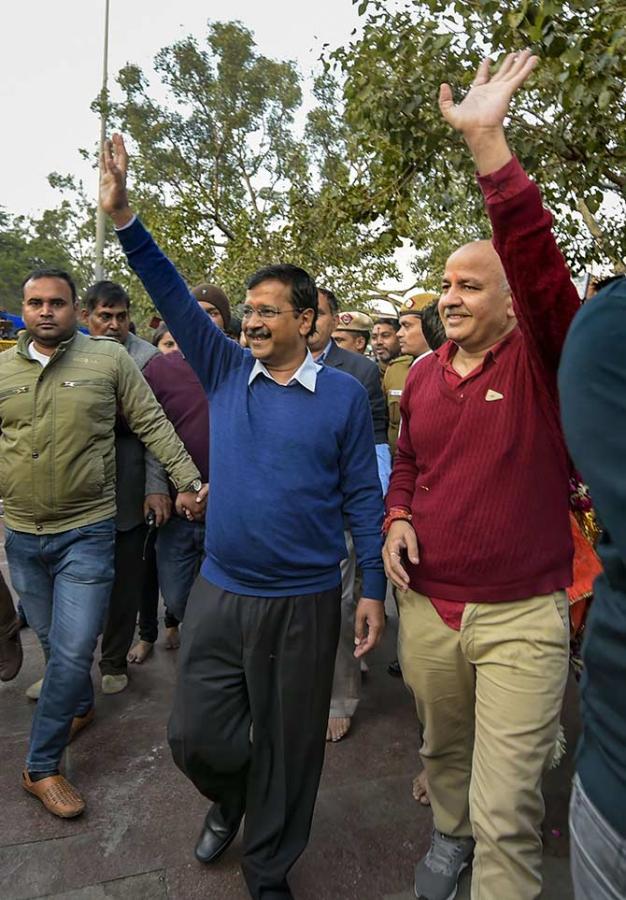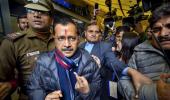'Kejriwal took political steps and micro level care at every level not to allow the consolidation of Hindu votes behind the BJP,' observes Sheela Bhatt, the distinguished political commentator.

Arvind Kejriwal and Delhi's voters have written a new chapter of history where the forces of the Right, who are wooing Hindu voters, have a new challenger, language and new confidence.
Nothing much remains to analyse Tuesday's results where the Aam Aadmi Party won 62 of Delhi's 70 assembly seats and the Bharatiya Janata Party won 8. The voters have spoken so loudly.
Kejriwal should not be undervalued by 'ifs and buts' because the BJP fought the Delhi election with all its might and lost it disgracefully.
It is an absolute electoral setback for the BJP and a personal defeat for Amit Anilchandra Shah, India's home minister.
Kejriwal's version of 'Vikas' (development) has won and Shah's version of 'Rashtravaad' (nationalism) has lost.
Shah could get his party around 8 percent more votes than it won in the 2015 assembly election -- 40% -- but it was way below AAP's 54% vote share.
It is a thumping victory for what Kejriwal represents and one of the biggest defeats for Shah who had taken command of the BJP's battle for Delhi.
The battle for Delhi acquired a heft disproportionate to its actual significance due to Shah's proactive efforts to take on the CAA issue via the election. At another level, he and his party created an ugly battle by pitching language to create a division of voters.
At one level, the battle was between Kejriwal and Shah's respective political poll strategies. At another level, the election was about Shah versus the Shaheen Bagh protests.
And there was another least discussed battle -- of a class war -- in the mega city of 20 million people where the lower middle class and poor had faith in Kejriwal to keep supplying freebies in an era when the Indian economy is depressed.
It is economically unaffordable in the long run for any government to provide free civic services, but Kejriwal has analysed the ground realties well since his election in 2015 and secured a huge advantage.
His sensitivity towards the cost of civic services to voters gave him Tuesday's sensational triumph.
This class war gave Kejriwal a reach that Shah could not breach with his 'identity politics'. The BJP lost the battle, but gained vote share so it is not exactly a straight victory for 'secular' forces against the BJP.
The Congress's complete rout created a particular situation where the consolidated Muslim vote helped the AAP in 20 seats.
Shah's failure is strikingly visible in Okhla where Shaheen Bagh is located. Here, the AAP's controversial candidate Amanulla Khan won with a margin more then what the BJP nominee polled.
It is a clear victory for AAP's restrained and dignified election campaign. AAP took great care of Hindu voter sentiments. Kejriwal took political steps and micro level care at every level not to allow the consolidation of Hindu votes behind the BJP.
It is sensational that Kejriwal never visited the protests at Shaheen Bagh which started as local women's civil resistance before becoming what it is today.
The results are a clear defeat for the BJP's divisive campaign that segregated Muslim voters who united and strategically voted for Kejriwal.
Kejriwal's victory also introduces a competitor on the right of centre of Indian politics.
Although Kejriwal has failed in the past when he contested against Narendra Damodardas Modi in the 2014 Lok Sabha election in Varanasi and when AAP contested the 2017 Punjab assembly election, he encounters better circumstances now. Young voters could be his new catchment area.
It was a victory for Kejriwal's brilliance that he eluded the trap laid by Shah to turn the Delhi battle into a 'secular versus communal' fight.
It was a forward movement for an electoral campaign in India that an incumbent regional party government fought an election with confidence on the issue of development against a national party.
Now, the BJP will be unable to ignore the trend set in Delhi.
'Show development, take our votes' is an offer from voters. It is a big time advantage for the poor. But the economic consequences will be felt if this model is adopted in other states. The Tamil Nadu trend of election time freebies has spread.
Kejriwal has developed a concoction of mild Right-wing politics with a Left-leaning governance style.
One does not know without having zero power bills in thousands of homes and in the absence of free daily bus travel to hundreds of thousands of Delhi women, how the BJP's 'divisive politics' would have worked on voters's minds.
One slum dweller, while watching Kejriwal's victory on television, anxiously wanted to know if bus travel for Delhi's women will remain free for the next five years. For a moment, she feared that Kejriwal's victory would end her free bus rides.
In the current economic era, free power, free travel on public transport and better schools for the poor certainly remains a priority. This 'class war' is the result of the craving to survive in a hopeless city with some decency.
The BJP's conventional voters have not deserted the party, but a depressed economy proved advanatagous for Kejriwal to retain his support.
Even though Kejriwal did not back or vociferously oppose the ongoing larger battle over the CAA/NPR/NCR throughout the election campaign, he was setting his own terms to woo Hindu voters.
Kejriwal will now ardently wish for the smooth winding up of the Shaheen Bagh protest. He is likely to prefer it through a court order.
Finally, one must mention that the democratic process of the Delhi election is proving the biases and impatience of critics of the current state of India, particularly, Western ones.
How little they know of India and about the Indian people! Their pessimism is misplaced. Not only is electoral democracy working smoothly in India, even institutions like the Election Commission work well in spite of imperfections.
What better proof of this than that Delhi's voters voted without fear and that too decisively against a party that rules the Centre.










